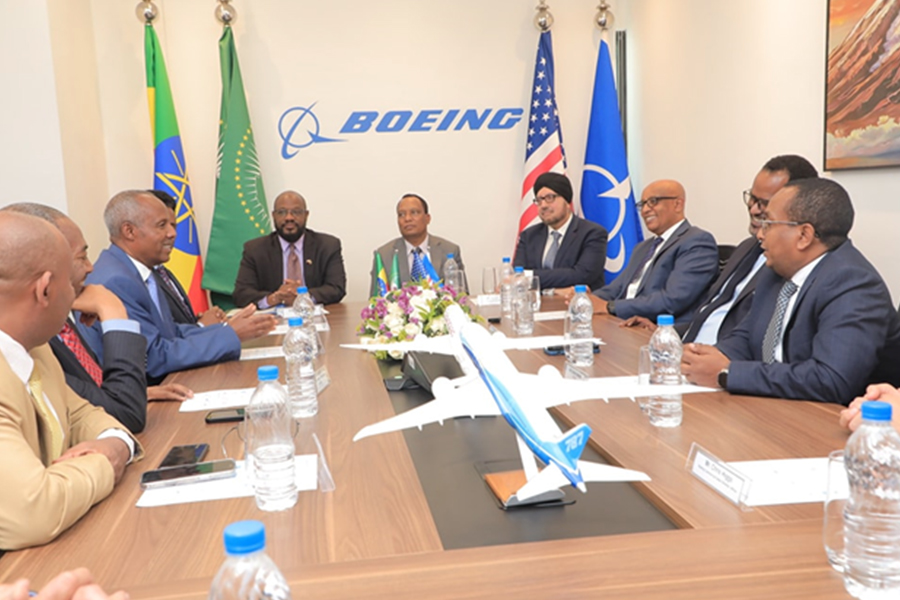
Commentaries | Jun 21,2025
Aug 5 , 2023
By Hintsa Andebrhan
As the punishing weight of thousands of sanctions looms heavily over Russia, isolating it on the global stage, a major event unfolding in St. Petersburg last month has shown the Kremlin's ability to assert its diplomatic influence, particularly with African countries.
This resilience and strategic manoeuvring were visible at the Russia-Africa Summit, where 49 African countries, including 17 heads of state, were present, an emphatic testament to Russia's strength in diplomatic arenas. Moscow's strategy seems to be paying dividends as the two-day Summit had a clear undertone – to impress upon African leaders the alleged 'proxy war' being waged by the West under the guise of Ukraine's ongoing crisis.
The Russians seem to have been successful in this, with the symbolic double-headed eagle – a national icon of Russia – a testament to their successful diplomatic overtures.
Dating back to the Berlin Conference of 1884-85, where Western countries met to divide Africa's resources amongst themselves, Russia stood as a notable absentee, refusing to participate in the colonial carve-up. This historical stance has ingratiated Russia with African countries, offering a narrative of solidarity that resonates deeply within the African continent. The recent Summit served as a platform for African leaders to express their growing frustration with the rules and regulations dictated by the Western world.
Most African leaders used the Summit as an opportunity to voice their desire for a departure from these imposed platforms, perceived as outdated and suffocating. In stark contrast, Moscow projects itself as a partner that respects Africa's political economy and strategic policies, shunning any interventionist behaviour. President Vladimir Putin confirmed this non-interference posturing in a recent article published on the Kremlin's official website.
"We have always strictly adhered to the "African solutions to African problems" principle . . . We have never tried to impose on partners our ideas about the internal structure, forms, and methods of management."
The Summit's structure offered an open space for exchanging strategic ideas rather than adhering to the usual formalities and performative niceties often observed at such international meetings. African leaders seized this opportunity to propose transformative economic strategies to benefit the continent's future generations.
Among the leaders who made a notable contribution was Uganda's President Youri Museveni. He argued that Africa must break away from its colonial economic roots, which restrict it to producing raw materials and crops.
He proposed an alternative vision: "What I want to propose to Russia and China is to discourage as a policy the importing of raw materials from Africa, to instead work with the Africans to add value at the source."
This sentiment was echoed by Eritrea's President, Isaias Afwerqi, who emphasised the need for an unambiguous strategy and effective mechanisms to strengthen cooperation between Africa and Russia. He stressed that "Africa must be ready to overcome the upcoming challenges for the betterment of the new generation of the continent."
The host, President Putin, echoed these sentiments and assured African leaders of Russia's firm stand against the unjust policies of the West, perpetuating the legacy of suffering in Africa from the colonial era. This commitment reflects Russia's intention to base its relationship with Africa on mutual interests and respect.
In an unexpected development, Ethiopia's Prime Minister Abiy Ahmed (PhD) arrived in St. Petersburg a day before the Summit, garnering a high-level reception from the Kremlin and a meeting with President Putin. Yet, his presence surprised many Ethiopians, given Ethiopia's ongoing engagement with US-led Western entities.
The lead-up to the Summit was not without intrigue. A phone conversation between Ukraine's President Zelensky to Prime Minister Abiy hinted at the possibility of outside influence, with some believing it had the fingerprints of Washington, DC. But the Summit concluded positively, underlining a burgeoning strategic partnership between Russia and Africa, seemingly undeterred by such manoeuvres.
As the geopolitical dance unfolds, the shifting alliances and strategies offer a glimpse of a possible new order in the making – one that sees Africa's autonomy acknowledged and respected rather than controlled and exploited. Time will tell whether these alliances benefit the continent and its people.
PUBLISHED ON
Aug 05,2023 [ VOL
24 , NO
1214]


Commentaries | Jun 21,2025

Fortune News | Jul 21,2024

Radar | Aug 06,2022

Radar | Apr 27,2025

Radar | Aug 23,2025

Fortune News | Nov 02,2019

Viewpoints | Aug 16,2020

Commentaries | Jan 16,2021

Radar | Nov 21,2020

Radar | Oct 24,2020

Photo Gallery | 180373 Views | May 06,2019

Photo Gallery | 170571 Views | Apr 26,2019

Photo Gallery | 161613 Views | Oct 06,2021

My Opinion | 137278 Views | Aug 14,2021

Dec 22 , 2024 . By TIZITA SHEWAFERAW
Charged with transforming colossal state-owned enterprises into modern and competitiv...

Aug 18 , 2024 . By AKSAH ITALO
Although predictable Yonas Zerihun's job in the ride-hailing service is not immune to...

Jul 28 , 2024 . By TIZITA SHEWAFERAW
Unhabitual, perhaps too many, Samuel Gebreyohannes, 38, used to occasionally enjoy a couple of beers at breakfast. However, he recently swit...

Jul 13 , 2024 . By AKSAH ITALO
Investors who rely on tractors, trucks, and field vehicles for commuting, transporting commodities, and f...

Nov 1 , 2025
The National Bank of Ethiopia (NBE) issued a statement two weeks ago that appeared to...

Oct 25 , 2025
The regulatory machinery is on overdrive. In only two years, no fewer than 35 new pro...

Oct 18 , 2025
The political establishment, notably the ruling party and its top brass, has become p...

Oct 11 , 2025
Ladislas Farago, a roving Associated Press (AP) correspondent, arrived in Ethiopia in...

Nov 2 , 2025
The National Bank of Ethiopia (NBE) has scrapped the credit-growth ceiling that had s...

Nov 2 , 2025 . By SURAFEL MULUGETA
The burgeoning data mining industry is struggling with mounting concerns following th...

Nov 2 , 2025 . By YITBAREK GETACHEW
Berhan Bank has chosen a different route in its pursuit of a new headquarters, opting for a transitional building instea...

Nov 2 , 2025 . By BEZAWIT HULUAGER
Nib International Bank S.C. has found itself at the epicentre of a severe governance...